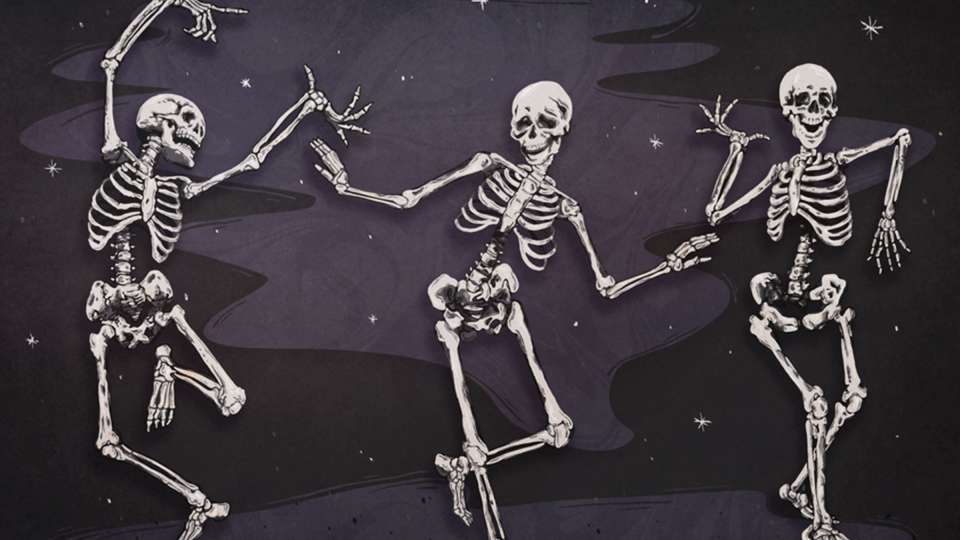
During this season of candy and creepy crawlies, it’s only natural to get into the Halloween spirit and take a deep dive into the world of things that go bump in the night.
And, since you’re already in the spooky autumn mindset, this may be a good time to tell you — you probably have more in common with those "night-bumping" things than you realize. True, you may not be actively eating brains (hopefully), floating down dark hallways or spending daylight hours in a coffin — but your human body is still doing some … strange things.
Want to know more? We’ve racked the brains of some UW Medicine experts to get a handful of strange and fascinating facts about the human body.
Your eyes may be deceiving you
Proof we might actually be living in the Upside Down? According to Dr. Jennifer Yu, an ophthalmologist at the Eye Institute at Harborview Medical Center and a UW School of Medicine clinical associate professor of Ophthalmology, what you see through your eyes reaches the retina upside-down. Your brain flips the images that you perceive.
Another eerie eyeball fact? You probably have some uninvited guests getting cozy in your hair follicles and oil glands.
"Demodex mites are tiny parasites that can be found in eyelashes and eyebrows and can only be seen with a microscope,” explains Yu. “They are very common and are generally harmless, but can sometimes cause symptoms like itching, burning and crusty red edges.”
They do remove dead skin — which can be helpful. But yes, you are now excused to go closely examine your eyebrows with a magnifying glass.
More than a bag of bones
Did you know that your body’s skeleton completely regenerates itself about every 10 years? Dr. Brian Krabak, a sports medicine specialist and team physician for UW Husky Athletics, shares this interesting tidbit. Basically, the body removes the old pieces of bone and replaces them with new, fresh tissue to keep you strong. However, as you age, that process can shift out of balance, causing loss of bone structure and bone diseases like osteoporosis.
He also notes that the body’s strongest muscle might surprise you (hint: it’s not your biceps).
“The masseter muscle in your jaw is the strongest muscle in your body,” says Krabak. “It is so strong it can produce a force greater than 200 pounds on your molars."
The good news? Maybe those brain-eating zombies will be no match for you and your chompers, after all.
Blood to your organs or bust
Dr. Kris Patton, a cardiologist at the UW Medicine Heart Institute, shares that inside the human body you can find 60,000 miles of blood vessels. That’s the equivalent of going around the world over two times — which is a mind-boggling distance.
Though they do have a lot of ground to cover, considering they’re responsible for delivering blood to all of the organs and tissues in your body — giving them oxygen and nutrients to, you know, keep you alive.
Make time for your manicure
Dr. April Schachtel, a dermatologist at UW Medical Center — Roosevelt, gives the inside scoop about those fingernails you may hear scratching at the door this season:
“Fingernails grow about 3 mm per month and toenails grow about 1 mm per month,” she explains. “Therefore, it takes 6 months to grow a whole new fingernail but can take 12-18 months to grow a whole new big toenail.”
Studies have also shown that fingernail and toenail length has increased by almost a quarter in the last 70 years — probably thanks to modern diets that are packed with more protein-rich foods.
Dare to dig deeper?
When it comes to the more unsettling facts, Dr. Jill Steiner, a cardiologist at the Heart Institute at UW Medical Center — Montlake, delivers the good(ie)s.
“There’s a specific type of tumor, called a teratoma, that often contains hair and bones, including teeth,” she explains.
Yes, these tumors are rare, though they can occur in people of all ages and can be either cancerous or noncancerous. And the name? That comes from the Greek teras, which means monster. But let me repeat that again for the folks in the back. You can develop a tumor in your body that has fully formed teeth. Good luck sleeping tonight.
Another couple of tidbits from Steiner? Adults produce and swallow around one to two liters of saliva daily, meaning that in one year, you could fill a couple of bathtubs with your spit. That also means that during the average lifetime (around 76 years), you may produce almost 28,000 liters of saliva.
Oh, and that dust you see around your home? Much of that is made up of your skin and the skin of your family and friends. Which makes sense considering humans shed their entire outer layer of skin every two to four weeks.
Happy spooky season!

 Healthy ideas for your inbox
Healthy ideas for your inbox





